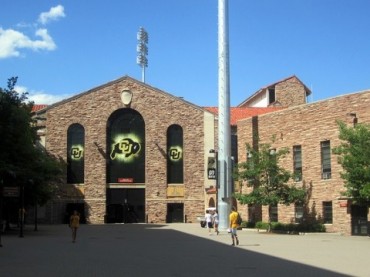
If a group of ethnic studies professors has their way, two recently remodeled dorms at the University of Colorado Boulder will be given difficult to read and pronounce – yet culturally sensitive – monikers.
Initially, the dorms were to be renamed after Chief Niwot and Chief Little Raven, two Arapaho chiefs known for their peaceful methods in dealing with early American pioneers and settlers.
That decision came in July, when the CU Planning Board approved the new names for the dorms. The newly remodeled Kittredge Central was to be renamed Little Raven Hall, and likewise Kittredge West was to become Niwot Hall.
However, members of the Native American and Indigenous Studies department want the dorm Little Raven Hall to be called “Houusoo” (pronounced Hosa) and “Niwot Hall” to be dubbed Nowoo3 (pronounced Nawath).
Whether students, parents, and visitors are able to read or correctly pronounce Houusoo or Nowoo3 is not a concern among the professors who signed a Nov. 13 letter to campus leaders calling for the name changes.
“While the orthographies might initially seem foreign or hard to understand to non-Arapahos and non-Natives, choosing to spell Nowoo3 as Niwot would be equivalent to spelling Charles de Gaulle’s name phonetically (Sharl duh Gahl), which is culturally chauvinist and clearly primitivizing in a Native American context,” the letter states.
Professors affiliated with the CU Boulder Native American and Indigenous Studies department were not happy about the “Anglicization” of the chiefs’ names, the letter states. According to these professors, anglicized or phonetic spellings of the chief’s names are not sufficient enough in honoring their memory.
“Neither phonetic spellings (Hosa, Niwot) nor literal translations … of these options seems culturally sensitive and attuned to the unique political status of Native Americans and Arapahos in Colorado, specifically,” the letter states. “Houusoo and Nowoo3 were the names these pivotally important and pacifist-oriented chiefs were known by, and we should honor them in their own languages in their own home (i.e., Boulder).”
The name change has already been approved by campus officials and the request is slated to go before the CU Boulder Board of Regents in February for final approval.
CU Boulder would not be the first institution of higher education to name buildings in the native language of the person or culture they are honoring.
These other institutions include Stanford University, with a native themed residence hall called Muwekma-Tah-Ruk; University of Massachusetts Amherst has a Native American student community named Kanonhsesne; and a library at the University of British Columbia is named Xwi7xwa.
By continuing this trend, the CU Native Studies department states “CU Boulder would be consciously and mindfully joining its peer institutions in meeting scholarly standards of 21st century Indigenous Studies research.”
However Thomas Lifson, editor and publisher of American Thinker, asserts that the professors of CU Boulder might have crossed the line of cultural sensitivity and into the realm of ridiculousness despite their best intentions.
Lifson states that the professor’s requested spelling change of the dorms’ names “was both a product of academic formalism – the Native American Studies people after all have a stake in the standardized form of Romanization of the Arapaho Language – and political correctness, contained in the impulse to put the preferences and interests of the tribe above the need of the users – the members and guests at the University who are unfamiliar with the notation. Because CU is an academic institution, academic formalism is to be expected.”
Fix contributor Julianne Stanford is a student at University of Arizona.
IMAGE: Wally G./Flickr
Like The College Fix on Facebook / Follow us on Twitter





Please join the conversation about our stories on Facebook, Twitter, Instagram, Reddit, MeWe, Rumble, Gab, Minds and Gettr.